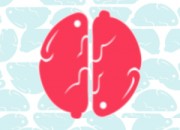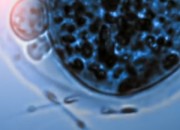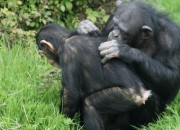Meet Throb, your new go-to resource for everything that’s science and sex, launched as a collaboration between the Gawker blogs io9 and Gizmodo. Among its posts you’ll discover juicy tidbits from a number of scientific disciplines as they apply to your tireless search for pleasure and romance. At the helm is Diane Kelly, a biologist you might remember from that infamous TED Talk about how erections work in mammals.
Research
In the modern rendering of the alpha male, the promise of access to territories, resources and protection for mating females is largely nonexistent — as is any notion of parental care investment. In this sense, the social aspects of “alpha” become conflated with those of dominance among species where females require only one thing from the male: his DNA.
In 2005, a protein was discovered on the surface of sperm thought to enable binding to the egg. Researchers named the protein Izumo, after the Izumo-taisha in Japan, a shrine dedicated to Okuninushi, the Shinto deity of marriage. The search was on to discover a counterpart protein on eggs. Last week, we found it — and it had been under our noses all along.
Nature defies our wildest imaginings, pushing the boundaries of what we know as possible. In some crocodilians, the female sex apparatus is so large, it is easy to confuse it with that of the male. In squid, the sperm travel into the female in a capsule that perforates the female body to deliver the sperm cells. Nature is a weird place and today, it got a little weirder. Meet the Neotrogla, a class of insects among which the female enters the male.
A recent study found that sex makes a difference in how well partners cope with physical illness in the relationship, suggesting that sex is the bridge that helps couples pull through during the tough times. A healthy sex life — whatever your preferred way of engaging in it — is a powerful first line of defense against stress and life difficulties.
Carin Bondar, the scientist who brought us the web series Wild Sex — about the weird and kinky sex rituals in the animal kingdom — is working on a new show about the wondrous place where sex and biology collide. Called Sex Bytes, this new offering features fast, quirky little weekly videos centered on a specific topic, drawing on scientific literature.
U.S. states known for the faith-based conservative beliefs of their denizens have a higher rate of divorce than more liberal states. Jennifer Glass at the University of Texas and Philip Levchak at the University of Iowa went county by county, taking notes of divorces in 2000 to answer why this is the case. Their findings suggest that one of the strongest factors predicting divorce is the number of conservative or evangelical Protestants in one’s county.
“In one study, US psychologists investigated social grooming in humans by asking participants to indicate their closest emotional relationship and report behaviors such as running their fingers through the person’s hair, wiping away their tears, scratching their back and non-sexual massage,” Jason Goldman writes at the BBC. “They found levels of relationship satisfaction and trust were both positively correlated with self-reported grooming frequency among romantic partners.”
So far, efforts to develop microdevices have had intriguing results — a six years ago, scientists got bacteria to motor beads using chemicals to control the movement of their whip-like tails. We’ve since moved on to sperm and magnetic fields. While seemingly curious, the potential applications for harnessing the power of microorganisms is immense: they could be used to deliver drugs to specific parts of the human body, for instance.
A study reveals that women are twice as likely to orgasm during sex with a partner than they are during casual sex. While its easy to chalk this up to stereotypes about women and their need for “emotional connection,” a variety of completely unrelated factors could be responsible for these results. Practice makes perfect is more obvious. But what about the impact of alcohol, or birth control on the body?
















